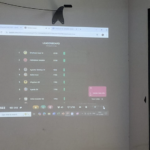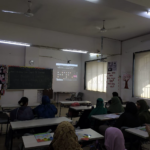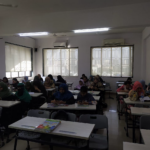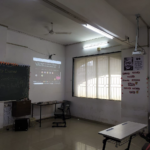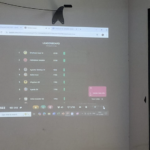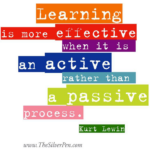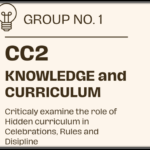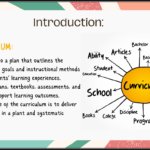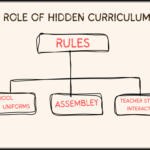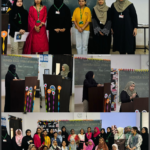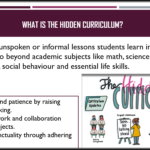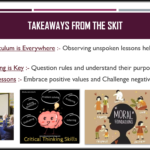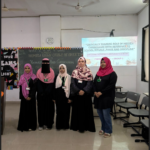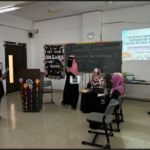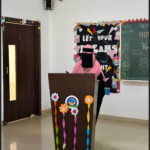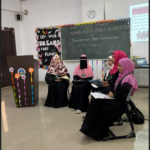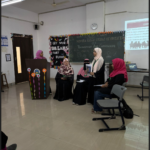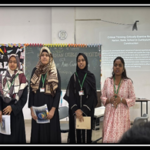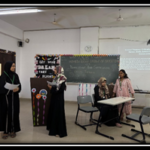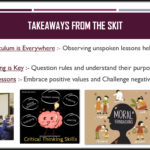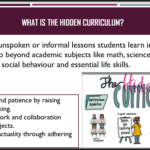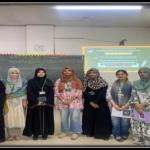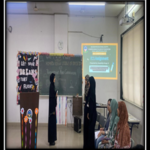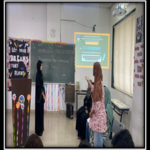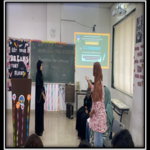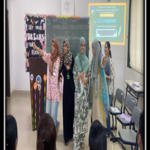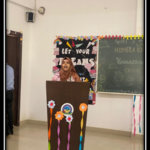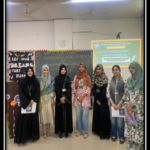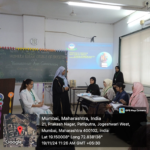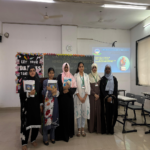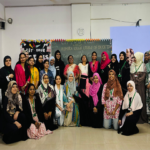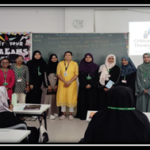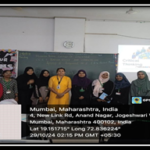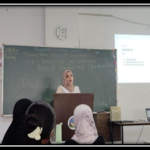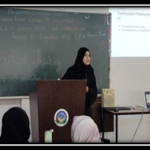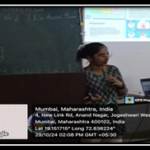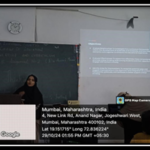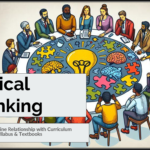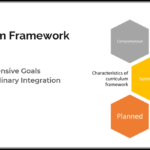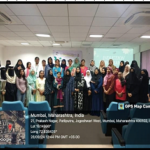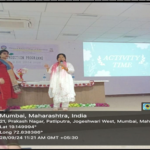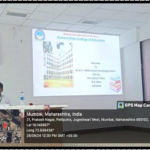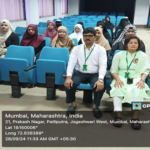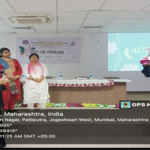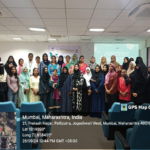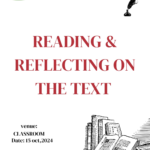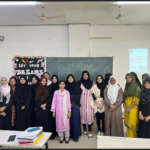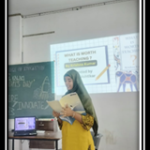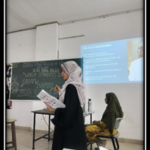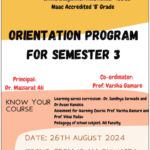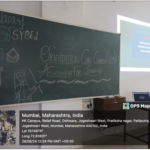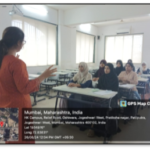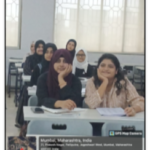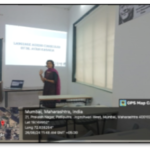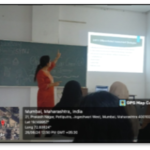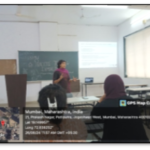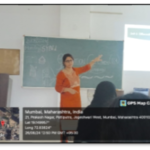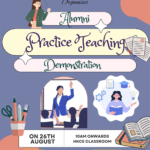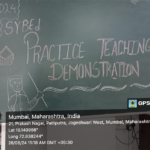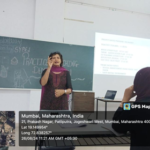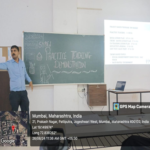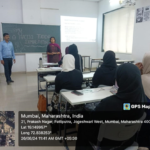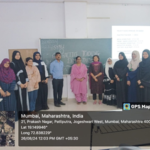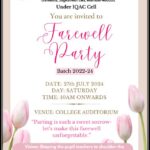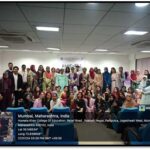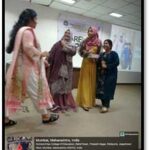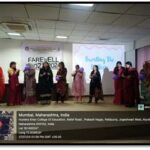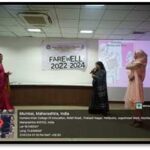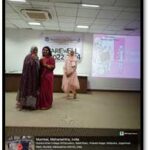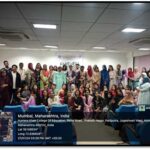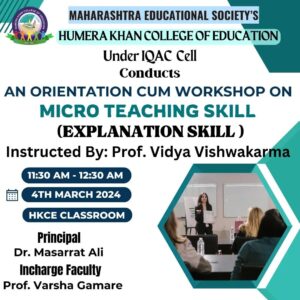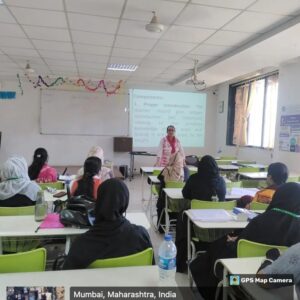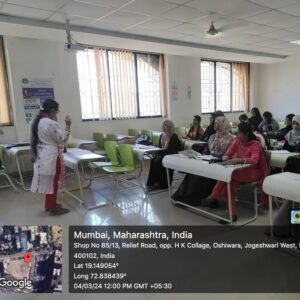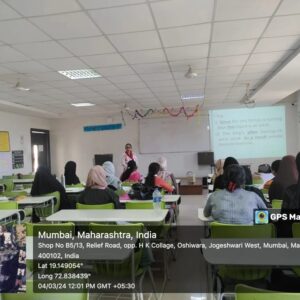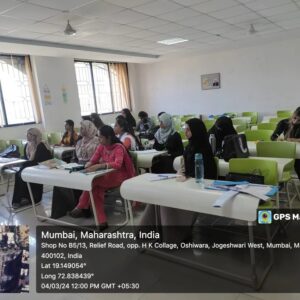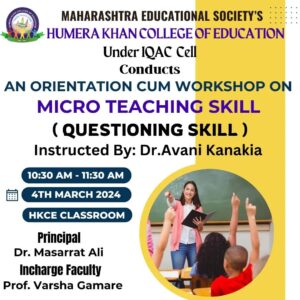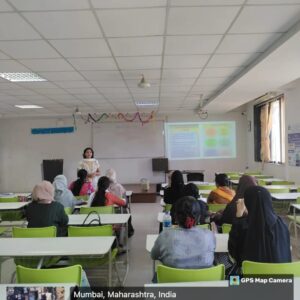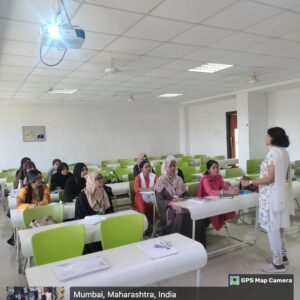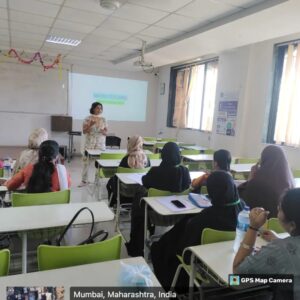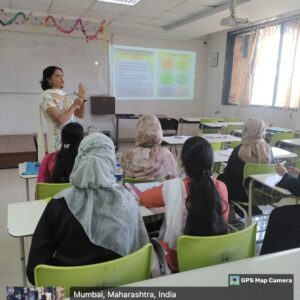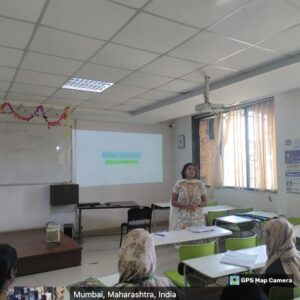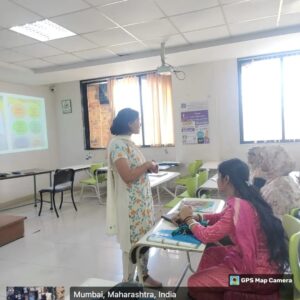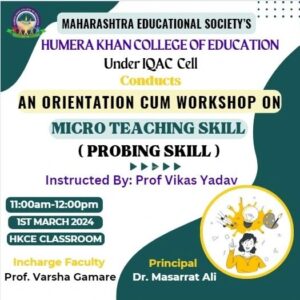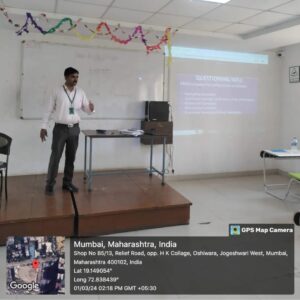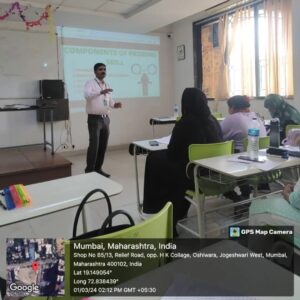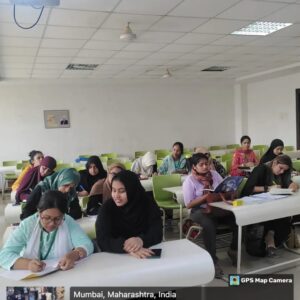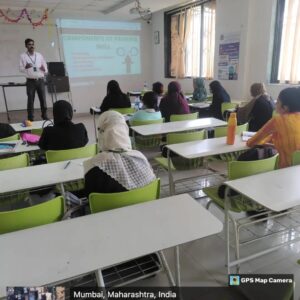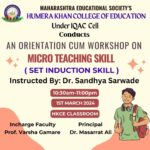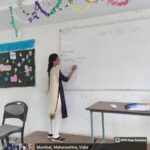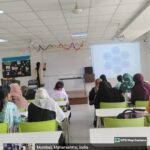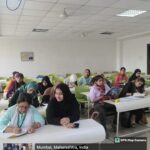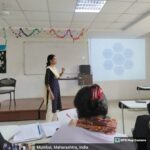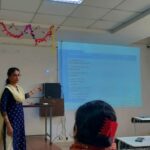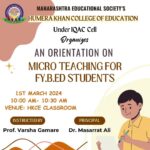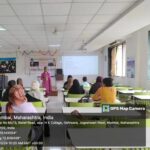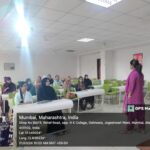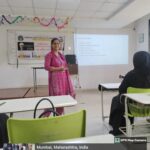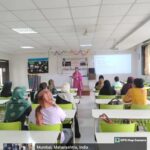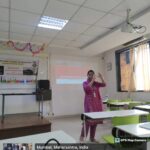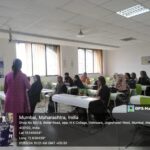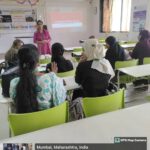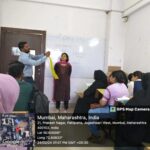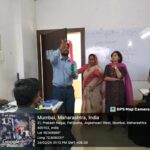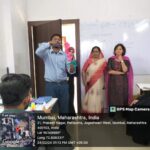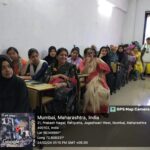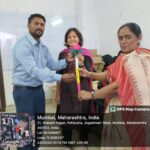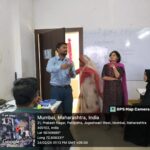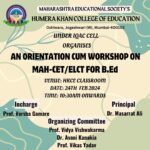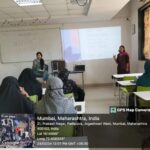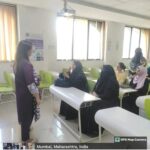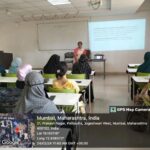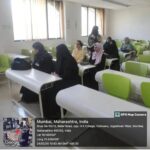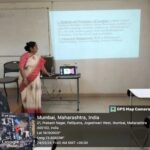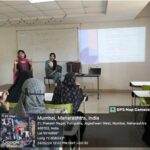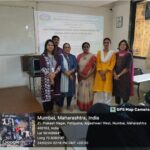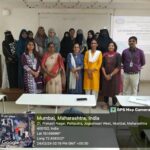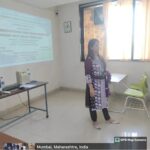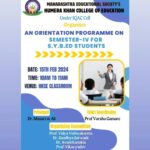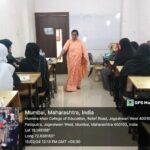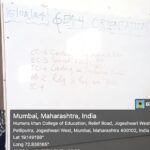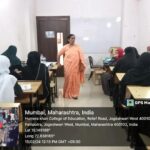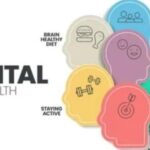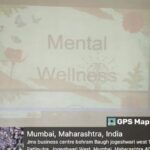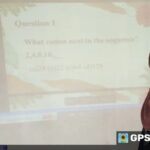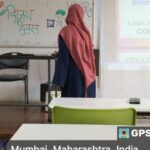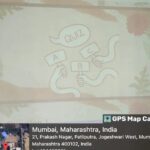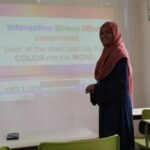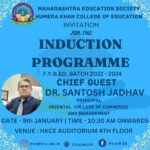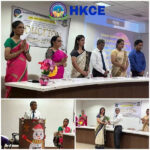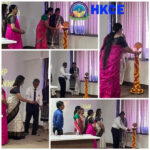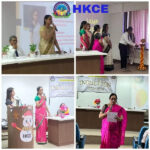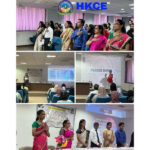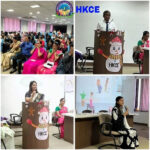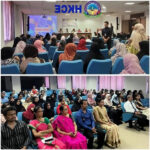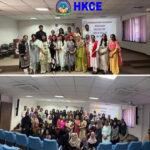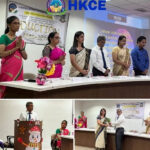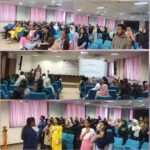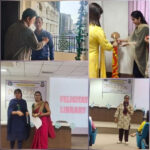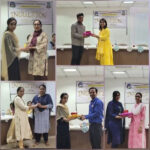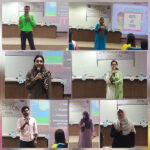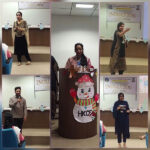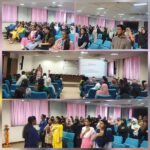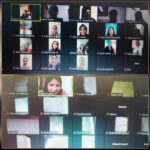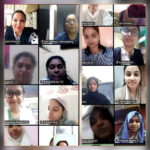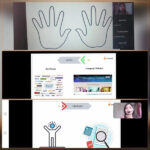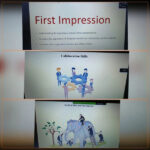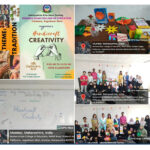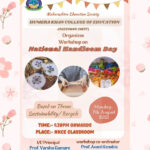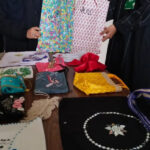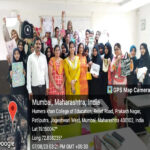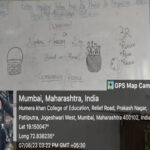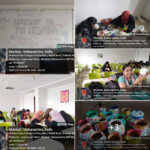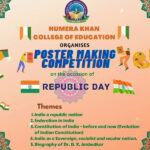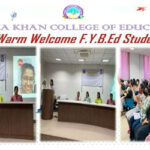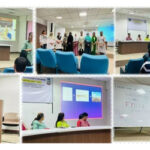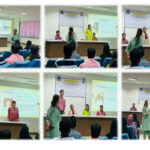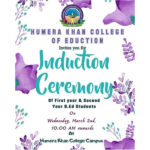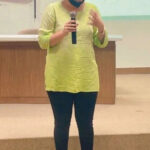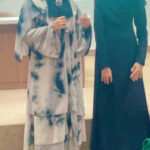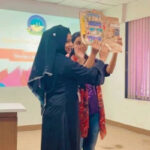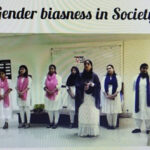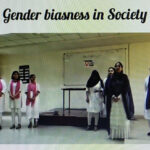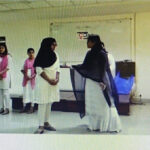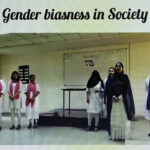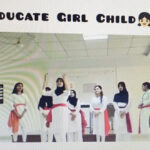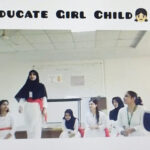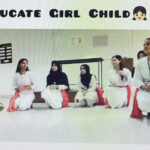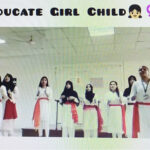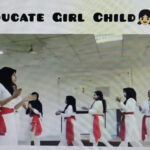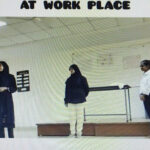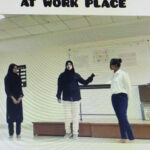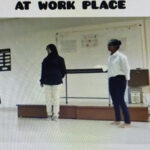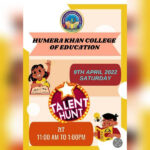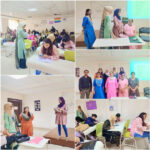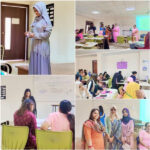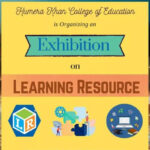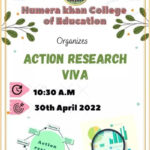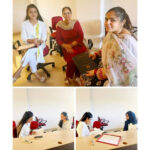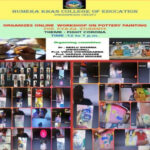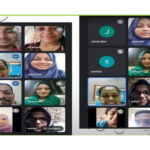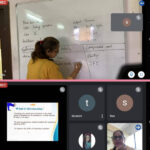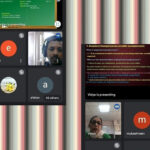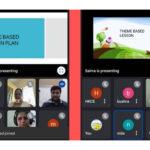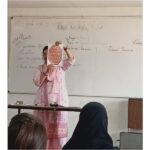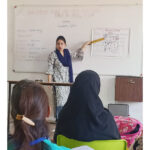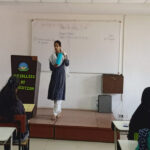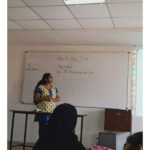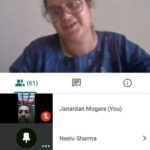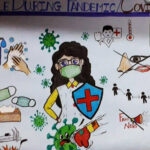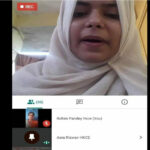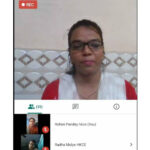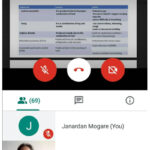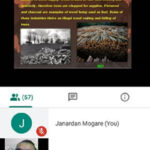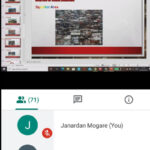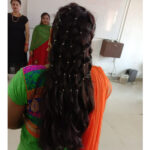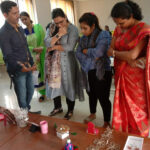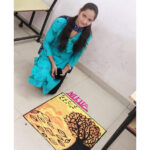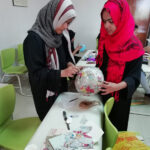![]() Report on Healthy Salad MakingActivity
Report on Healthy Salad MakingActivity
![]() Talent Hunt 2025: Creative Writing
Talent Hunt 2025: Creative Writing
![]() Talent Hunt 2025: Board Artistry
Talent Hunt 2025: Board Artistry
![]() Talent Hunt 2025: Skit Competition
Talent Hunt 2025: Skit Competition
![]() Talent Hunt 2025: Singing Competition
Talent Hunt 2025: Singing Competition
Report on Online Quiz Competition
Course: IC 1 Gender, School and Society (Unit 5 & 6)
Date: 7th December 2024
Course In charge: Dr. Sandhya Sarwade
Time: 2:30pm to 3:30 pm
Event: Online Quiz competition (Quiz.com)
Link: https://quizizz.com/join?gc=951013&authuser=0
Participants: F. Y. B.Ed. (Batch 2024-26)
Report:
Humera Khan College of Education conducted a quiz competition for F.Y. B.Ed Students (Batch 2024-26) on Course IC 1 Gender, School and Society, Unit 5 and 6 on 7th December 2024. The quiz was uniquely designed by Dr. Sandhya Sarwade with a live, time-bound format where students had to click on the correct answers within a limited timeframe. This setup included a dynamic leaderboard that displayed scores immediately after each round, keeping the excitement and engagement levels high throughout the competition.
The quiz proved to be both informative and stimulating, capturing the interest of all participants. The structure encouraged quick thinking and active participation, making it a fun yet educational experience.
Learning Outcome:
The quiz enhanced students’ understanding of the subject matter by reinforcing key concepts in a practical way. The timed format improved their ability to manage time effectively and make decisions under pressure. The instant feedback and leaderboard helped students self-assess their performance, identifying their strengths and areas needing improvement. Additionally, the interactive and competitive nature of the quiz fostered enthusiasm, engagement, and collaboration among students, making learning both dynamic and enjoyable. Overall, the event successfully created an environment that promoted knowledge retention, quick thinking, and healthy competition.
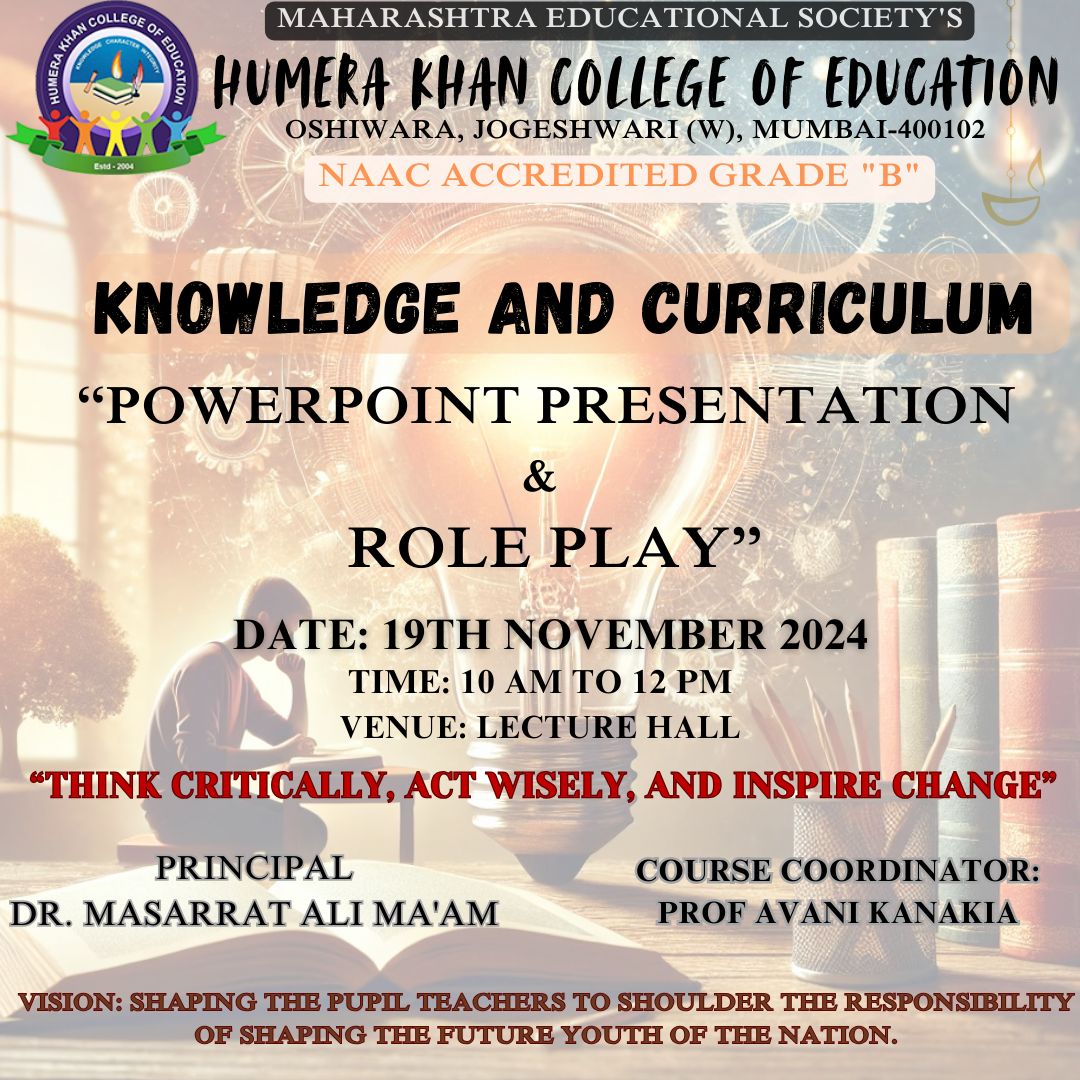
Report on CC2 Presentation by Assembly Group 1
DATE: 19/11/2024
SUBJECT: Knowledge and Curriculum
TOPIC: Critical Thinking: Critically Examine Role of Hidden Curriculum in Celebrations, Rules, Discipline.
Topics covered by participants:
| Sidrah Khokar | Introduction of Curriculum and Hidden Curriculum |
| Shakirah Shaikh | Objectives of Hidden Curriculum |
| Soni Yadav | Role of Hidden Curriculum in Celebrations |
| Amal behlim | Role of Hidden Curriculum in Rules |
| Sidrah Shaikh | Role of Hidden Curriculum in Discipline |
| Roshni Rajbhar | Conclusion |
| Allyshan Faridi | – |
| Sadaf | – |
On 19th, November, a group presentation was conducted as part of our assignment, where GROUP 1 presented the PPT presentation on the Topic Critical Thinking: Critically Examine Role of Hidden Curriculum in Celebrations, Rules, Discipline The presentation aimed to explore critical thinking of hidden curriculum, with each member contributing to different sections to provide a comprehensive overview.
The group displayed strong teamwork and cohesion, with smooth transition between sections. Visual presentation was well-designed and enhanced the overall understanding of the topic. Participants were well-prepared and confident, effectively engaging the audience.
CONCLUSION:
The group PPT presentation on the Hidden Curriculum effectively highlighted its significant impact on rules, discipline and celebrations within educational settings. Through thorough research, clear visuals, and cohesive teamwork, the presenters conveyed complex concepts in an engaging manner. Overall, it was a well executed effort that provided valuable insights.
Report on CC2 Presentation by Assembly Group 2
DATE: 19/11/2024
SUBJECT: Knowledge and Curriculum
TOPIC: Critical Thinking: Critically examine role of hidden curriculum with reference to school rituals ,rules and discipline
Participants:
| Aqsa | Present |
| Naziya | Present |
| Lubna | Present |
| Muskan | Present |
| Nahid | Present |
| Uzma | Present |
| Sadiya | Absent |
The Role play “What We Learn Without Knowing” focused on the idea of the hidden curriculum, which includes lessons students learn in school that are not part of the regular subjects. The characters in the skit—Aqsa, Nazia, Muskan, Lubna, and Nahid—discussed how school teaches more than just academics. They talked about teamwork, respecting rules, and how to cooperate with others, all of which are learned without being directly taught. The skit showed that these lessons are important but sometimes go unnoticed.
The characters helped explain different aspects of the hidden curriculum, with Aqsa being thoughtful, Nazia questioning things, Muskan observing, Lubna adding humor, and Nahid being practical. They also discussed how some lessons, like questioning authority, are important for critical thinking. The skit encouraged the audience to think about the lessons they learn every day and whether they are helpful or not. It was a fun and engaging way to understand how school shapes us in ways we don’t always realize.
In conclusion, the skit, accompanied by the PPT presentation, successfully explored the concept of the hidden curriculum, shedding light on the unintended lessons that students learn throughout their school years. It encouraged critical thinking and reflection, inviting students to question the rules and norms they encounter and consider their broader impact. Through its combination of humour, diverse perspectives, and thought-provoking ideas, the skit effectively communicated the importance of the hidden curriculum in shaping students’ growth, both academically and personally.
Report on role Play and Presentation (Assembly Group 3)
Date: 19/11/2024
Subject: Knowledge and Curriculum
Topic: Critical Examine the Role of Nation, State and School in Curriculum Construction
| Name of Student | Present or Absent |
| Farhana Shaikh | Present |
| Soni Shaikh | Present |
| Shaheen Kazi | Present |
| Kiran Yadav | Present |
| Pooja Kushwaha | Absent(Health issue)(given content) |
| Farhana Sayyed | Absent |
On 19th Nov., we presented assignment.
We are assembly group 3, and we presented PPT and Role play on out topic. Our topic was “Critical Examine the Role of Nation, State and School in Curriculum Construction
Firstly we presented PPT., and did the explanations on that and the student takes the topic and explains that topic briefly.
Shaheen:- Critically Examine the Role of Nation State and School in Curriculum Construction
Soni:- The Importance of Critical Thinking in Curriculum Development
Farhana:- The Role of the Nation: How National Interests Shape Curriculum
Kiran:- The Role of the State: Centralized vs Decentralized Curriculum Policies
Shaheen:- Examining Biases and Assumptions in Curriculum Design
And After PPT presentation, we did role play, we’re following students plays the role:-
Village Headmaster:- Shaheen
Urban Teacher:- Soni
Rural Student:- Kiran
Villager:- Farhana Shaikh
In this role we explain about urban and rural school and curriculum discussion, where the headmaster plays their role and the students ask about their studies and the villager clear his doubts about the new courses and says ” Will our children find job after studying these subjects. ” And we ended our role play with slogan i.e. “Education is the key to a brighter future. ”
CONCLUSION:
The group PPT presentation on the Role of Nation, State and School in Curriculum Construction effectively highlighted its significant impact on rules, discipline and celebrations within educational settings. Through thorough research, clear visuals, and cohesive teamwork, the presenters conveyed complex concepts in an engaging manner. Overall, it was a well executed effort that provided valuable insights
Report on role Play and Presentation by Assembly Group 04
DATE: 19/11/2024
SUBJECT: Knowledge and Curriculum
TOPIC: Critical Thinking : Critically Examining the Role of the National Curriculum Framework
Participants in role play and presentation
| Name | Roll no. | Topics covered by participants |
| Rubab kojar | 23 | Introduction of national curriculum framework 2005 and major shift |
| Hasina Ashtikar | 04 | Need of national curriculum framework 2005 |
| Ayeda shaikh | 38 | Needs of national curriculum framework 2005 |
| Shama Khan | 20 | Objectives of NCF 2005 |
| Mehreen Khan | 17 | Objectives of NCF 2005 |
| Aiman Sayyed | 32 | Objectives of NCF 2005 |
| Mariyam Khan | 15 | Objectives of NCF 2005 |
| Nazish Ansari (participate in presentation) | 02 | Conclusion |
On 19th November, our group conducted a role play and presentation on the topic:
“Critical Thinking: Critically Examine the Role of National Curriculum Framework
2005.” The role play effectively illustrated the shift in education before and after NCF 2005, highlighting the transition from rote memorization to a more student-centered, critical thinking approach. We incorporated creative elements to engage the audience, reflecting the dynamic and interactive nature of modern teaching methods under NCF 2005.
The presentation provided a comprehensive overview, starting with an introduction to NCF 2005, followed by an explanation of its objectives, needs, and major shifts. We discussed how the framework emphasizes child-centered learning, connecting knowledge to real-life situations, reducing the curriculum burden, and fostering critical thinking. In addition, as one of our group members was absent, we included her voice recording in the PPT to present the conclusion, ensuring a smooth and complete delivery of our topic.
Conclusion:
The group role play and PPT presentation on “Critical Thinking: Critically Examine the Role of National Curriculum Framework 2005” effectively demonstrated the transformative shift in education introduced by NCF 2005. Through engaging visuals, thorough explanations of its objectives, needs, and major shifts, and cohesive teamwork, we highlighted how NCF 2005 promotes student-centered learning, critical thinking, and real-world connections. The presentation successfully conveyed the importance of these changes in fostering a more dynamic and meaningful educational experience. Overall, it was a well-executed effort that provided valuable insights into the impact of NCF 2005 on the modern education system.
ASSEMBLY GROUP NO – 5
DISCRIPTION OF THE ROLE PLAY :
THE TOPIC OF THE ROLE PLAY WAS ENACTED CURRICULUM AND AND ITS IMPORTANCE . THE ROLE PLAY WAS DONE BY ALL THE 6 MEMBERS IT MAJORLY EMPHASIZED THE INTERACTION BETWEEN PARENTS, TEACHERS, STUDENTS, CURRICULUM DEVELOPER AND POLICY MAKER .
| MEMBERS | ATTENDANCE |
| FATIMA GHALTE | PRESENT |
| RUKAIYA SHAIKH | PRESENT |
| HOORBANO SHAIKH | PRESENT |
| BUSHRA MULLA | PRESENT |
| RABIYA SHAIKH | PRESENT |
| MEHNAZ KHAN | PRESENT |
Report on Presentation by Group 6
Subject: Knowledge and Curriculum
Topic: Critical Thinking: Critically Examine the Relationship with Curriculum Framework, Syllabus, and Textbooks
Date of Presentation: 29 October 2024, Tuesday
On 29th October 2024, Group 6 delivered an insightful presentation on the topic Critical Thinking: Critically Examine the Relationship with Curriculum Framework, Syllabus, and Textbooks as part of the subject Knowledge and Curriculum. The presentation aimed to explore the essential role of critical thinking in the alignment of these components and its importance in shaping effective education. Below is a summary of the contributions made by each group member:
- Introduction: Juveria Shaikh provided a strong opening, highlighting the significance of the topic in the context of education.
- Meaning and Definition: Mansi Jaiswal elaborated on the concept of critical thinking with clear definitions and practical interpretations.
- Objectives: Afreen Ahmed explained the objectives of integrating critical thinking into educational frameworks.
- Characteristics of Curriculum Framework: Almas Khan detailed the essential features of a curriculum framework, emphasizing its foundational role.
- Characteristics of Syllabus: Aisha Kazi described the distinctive traits of a syllabus, underlining its purpose and structure.
- Characteristics of Textbook: Sumaiyya Shaikh outlined the features of textbooks and their relationship with curriculum and syllabus.
- Evaluation of Alignment: Laiba Ansari analyzed the alignment between the curriculum framework, syllabus, and textbooks.
- Promotion of Critical Thinking: Rafat Aaliya Sayyed presented strategies to promote critical thinking through these educational elements.
- Feedback Mechanism: Sheetal Rathod discussed the importance of feedback in fostering critical thinking in the learning process.
- Conclusion: Surekha Chavan summarized the presentation effectively, leaving a lasting impression on the audience.
- Presentation Design: Ayesha Siddiqa Sayyed prepared the PowerPoint presentation, which was visually appealing and well-structured.
The team demonstrated exceptional teamwork and a thorough understanding of the topic. The presentation concluded with an interactive session, reflecting a deep engagement with the audience. The feedback received from faculty and peers was overwhelmingly positive, with particular praise for the clarity and relevance of the content presented.
Group 6’s presentation was an excellent example of collaborative effort, critical thinking, and effective communication, contributing significantly to the learning experience in the subject Knowledge and Curriculum.
INDUCTION PROGRAMME FY.B.ED. 2024-26
Venu – HKCE Auditorium
Date – 28th September ‘ 2024
Time – 10:30 am – 02:30 pm
AGENDA
| Sr.No | Activities | Time |
| 1 | Lighting of the Lamp | |
| 2 | Assembly by SY Students | 9:30 am to 9.45am |
| 3 | Felicitation by SY students | 9:45am to 9:55am |
| 4 | Principal’s Speech | 9:55 am to 10:00 am |
| 5 | Faculty Introduction | 10:00 am to 10:15 am |
| 6 | Student’s Introduction | 10:15; am to 11:00 am |
| 7 | B.Ed. Course Orientation (By Principal Ma’am) | 11:00m to 11:30 am |
| 8 | Vote of Thanks (By GS Miss Samrin of S.Y.B. Ed) | 11:30 am to 1:00pm |
| 9 | Campus Visit | 1:00 pm to 1:05 pm |
| 10 | Break | 1:15 pm to 1:30 pm |
| 11 | Non- inflammable Cooking Competition by S.Y.B.Ed. Students | 1:30 pm to 2:30 pm |
An Induction Programme was organised by Humera Khan College of Education for F.Y.B. Ed student year 2024 – 2026. The event was In the presence of all the faculty members were there including SY.B.Ed students in charge. The programme began with the assembly presented by S.Y Students.
On Behalf of Principal Dr. Masarrat Ali Saheb Dr. Avani Kanakia Ma’am has introduced our dearest Principal. An introduction session was conducted for the F.Y.B.Ed students where they introduced themselves with academic qualifications, interest area and why did they join B.Ed Course. Our Chief Coordinator Prof. Varsha Gamare presented the B. Ed Course Orientation. All the respected faculty members of HKCE introduced themselves with their qualifications, area of specialization, subject expert. The S.Y.B.Ed Students Miss Samrin and Miss Saniya organised F.Y. B.Ed students for the campus visit and at the end there was food feast organised by the S.Y.B.Ed Students for all the students and staff.
An Induction programme for FY.B.Ed (First Year Bachelor of Education) students serves as an introduction to the course, college, and teaching profession. It helps students transition smoothly into the academic environment, familiarize themselves with the expectations, and engage with the community.
Objective
- To Introduce students about the Ed program structure, subjects, and the pedagogical methodologies they will encounter during their studies.
- To provide a foundational understanding of the philosophies and theories of education that will shape their approach to
- To encourage students to start thinking of themselves as future educators and understand the responsibilities of a
- To help students appreciate the multifaceted role of a teacher, including instructional, managerial, and mentorship
- To Create awareness about current challenges in education, such as inclusivity, digital literacy, and evolving teaching methodologies, to prepare students for the modern
- To promote a strong sense of ethics and professionalism that will guide students in their teaching careers
Significance
The significance of FY.B.Ed induction programme lies in its role as an introduction to the teaching profession and to the expectations of a B.Ed course.
It familiarizes students with the role and responsibilities of a teacher, creating a mindset focused on educational goals, ethics, and values. Students are introduced to the curriculum, teaching methodologies, and pedagogy, helping them develop the foundational knowledge needed for their studies. The programme fosters interaction between students, faculty, and experienced educators, encouraging networking and mentorship that can shape their professional development.
It helps students understand the broader educational environment, including policies, institutions, and the societal role of education, especially in the Indian context. Starting a B.Ed programme can be overwhelming, and the Induction helps in reducing anxiety and creating a sense of belonging, motivating students to engage actively in their course.
The induction often includes workshops and activities aimed at developing communication, leadership, and classroom management skills, essential for a future teaching career. It encourages students to set personal and professional goals for the B.Ed journey, ensuring they stay focused on what they want to achieve as educators.
Overall, the induction programme lays a solid groundwork for the students’ academic and professional journey.
Learning Outcome/Reflection
The induction program for the FY.B.Ed course aims to provide a strong foundation for aspiring teachers, equipping them with the necessary skills, knowledge, and mindset to excel in the field of education. Upon completion of the induction program, students will have a clear understanding of the course objectives, teaching methodologies, and the role of a teacher in shaping young minds. They will develop essential skills in classroom management, lesson planning, and effective communication, while fostering a reflective and learner-centred approach to teaching. Additionally, the program instils a sense of professionalism, ethical responsibility, and a commitment to continuous learning, preparing students to navigate the challenges of the teaching profession with confidence and competence.
BOOK REVIEW [PRESENTATION OF A BOOK REVIEW OF EDUCATIONAL SIGNIFICANCE]
DATE:- 15/10/2024
On 15th of October, 2024, Humera Khan College of Education organized book review presentations in educational context. This was done in a classroom setting and was supervised by faculty member, Prof. Shenaz Khan. Each student from FY.B.Ed class was required to take part individually and speak about different books by prominent educationists of the world. Key among the authors were APJ Abdul Kalam, J. Krishnamurti, Paulo Coelho, Krishna Kumar, and Dr Anshu Rupanwar. Each student gave a detailed review, sharing their thoughts and personal opinions about the books they picked.
OBJECTIVE:-
- Encourage students to read and understand the works of great educationists.
- Give students a chance to express their mind, opinion, in front of the class.
- It aims to develop self-confidence and promote personal growth.
- It also encourage students to think critically
SIGNIFICANCE:-
- It emphasized the importance of reading as a fundamental practice for educators in order to promote a culture that allows and appreciates learning.
- It also offered a space for the students to appreciate the ideals and works of great authors, thus broadening the scope of their understanding about education.
- This also develops analytical capabilities in the students and are able to assess the information they come across, recognize the bias in it, and develop an opinion.
LEARNING OUTCOME:-
- Students developed an interest in reading books.
- Building confidence was achieved by class presentations which lessened the fear of talking to the public.
- They also learned new words and phrases.
- It also improved their ability to express their thoughts.
- It enhanced their capacity to understand others opinions.
CONCLUSION:- The book review session on 15th October 2024 at Humera Khan College of Education was a helpful experience. It allowed students to discuss important educational books, share different views, and improve their thinking and speaking skills. The faculty gave useful feedback on each presentation, pointing out what was done well and what could be improved. This helped student’s better understand the books. Overall, the session created a friendly learning space, motivating students to keep exploring educational books and reminding them of the importance of learning throughout their teaching careers.
Orientation Program for semester 3
Venue: HKCE Classroom
Topic: Orientation Semester – III
Date: 26th August 2024
Humera Khan College of Education organized Orientation for S.Y.B.Ed semester III on 26th August 2024.
Agenda:
| Sr.No. | Particulars | Faculty Names | Time |
| 1 | Orientation for semester – III | Dr. Massarat Ali | 9:30-10:30 |
| 2 | Assessment for Learning Course Orientation | Asst. Prof. Varsha Gamare | 10:30-11:30 |
| 3 | Pedagogy of School subjects-II Course Orientation | All Faculty | 11:30-12:30 |
| 4 | Language Across Curriculum Course Orientation | Dr. Sandhya Sarwade/Asst. Prof. Shenaz Khan | 12:30-1:00 |
| 5 | Project Based Orientation | Asst. Prof. Avani Kanakia/Asst. Prof. Vikas Yadav | 1:30-2:30 |
Objectives:
- Help students understand what to expect in their third semester, including the subjects, assignments, and exams they will be dealing with.
- Offer advice on how to manage their time, study effectively, and balance their coursework with other responsibilities.
- Encourage students to connect with their peers, teachers, and staff to create a supportive learning environment.
- Give students a chance to ask questions and address any worries they might have about the upcoming semester.
Significance:
- It helps students start the new semester smoothly, reducing any worries or confusion about what’s ahead.
- Students become better prepared for their studies, which can lead to better grades and more confidence.
- Orientation helps students understand what they need to achieve in the semester and why each subject is important.
- By learning about the resources and support available, students are more likely to stay interested and motivated.
- Addressing any questions or concerns right away helps prevent problems from getting bigger later on.
Content:
- The orientation started at 10 AM. Our Principal, Dr. Massarat Ali, introduced us to the Semester 3 orientation.
- After that, Prof. Varsha Gamare explained the Assessment for Learning course, talking about each unit and why they are important for both this course and our future.
- Each teacher then presented their own pedagogy subjects.
- Sandhya and Prof. Shehnaz Khan gave an orientation for the Language Across Curriculum course.
- Finally, Dr. Avani ma’am and Prof. Vikas introduced the project-based orientation, explaining each unit and its content clearly.
Learning Outcomes:
Students deepen their knowledge of pedagogical theories and practices, learning how to effectively plan and deliver engaging lessons that cater to diverse learners.
Students learn how to design and evaluate curriculum plans that align with educational standards and promote student learning and development.
Students develop skills in designing various assessment tools, interpreting assessment data, and providing constructive feedback to students to enhance their learning outcomes.
Students acquire skills in managing classroom dynamics, fostering a positive learning environment, and effectively addressing behavior issues to promote a conducive learning atmosphere.
Humera Khan College of Education on 26th August 2024 conducting a practice teaching demonstration by prof. Avani Kanakia and Prof. Vikas Yadav.
Venue: HKCE Classroom
Topic: practice teaching demonstration
Date: 26th August 2024
Objective:
- Lesson Planning: Develop and present a well-structured lesson plan that includes clear learning objectives, instructional strategies, and assessment methods.
- Content Delivery: Demonstrate effective communication skills by delivering content clearly and engagingly, using appropriate teaching aids and materials.
- Student Engagement: Employ techniques to actively involve students in the learning process, such as questioning, discussions, or interactive activities.
- Classroom Management: Showcase strategies for maintaining a positive and productive classroom environment, including managing student behavior and facilitating group work.
- Differentiation: Adapt teaching methods to meet the diverse needs of students, providing support for different learning styles and abilities.
- Assessment and Feedback: Use formative assessment to evaluate student understanding and provide constructive feedback to support their learning progress.
- Reflection: Reflect on the teaching demonstration to identify strengths and areas for improvement, showing an understanding of how to continuously enhance teaching practices.
Significance:
Skill Development:
Mastery: Regular practice helps in mastering teaching techniques and strategies. It allows educators to become more effective in delivering content and managing classrooms.
Confidence: Builds confidence in teaching abilities and helps in handling various classroom situations with greater ease.
Improved Teaching Effectiveness:
Refinement: Continuous practice enables teachers to refine their teaching methods, making lessons more engaging and effective.
Adaptability: Helps teachers become more adaptable and responsive to different learning needs and classroom dynamics.
Professional Growth:
Ongoing Learning: Encourages ongoing professional development and lifelong learning. Teachers who practice regularly are more likely to stay updated with new educational strategies and technologies.
ContentHumera Khan College of Education conducted practice teaching demonstration on 26th August 2024 and it was conducted by Prof. Avani Kanakia and Prof. Vikas Yadav
The workshop started at 11:00 am in the morning and lasted till about 12:30pm in which various information about practice teaching demonstration Avani Ma’am explained about practice teaching and told what topics are in practice Teaching .Then she is explaining one by one. The first lesson plan is that you have 10 lessons and 5 lesson plans for the co teaching and also It has to be done on them basis And after that you have to make blueprints like question paper and after that the teacher told how many marks are there for the topics then the teacher explained the lesson plan sheet and told what are the core values and how to write. It’s kind of After that, the head explained how to do set induction and gave some mathematical examples and explained it very well. After that, all the teachers and students took a picture together.
Learning Outcomes
- Use Action Verbs: Start each outcome with a clear, measurable action verb such as “analyze,” “compare,” “demonstrate,” or “evaluate.” This helps in setting clear expectations and assessing whether the students have achieved the outcome.
- Be Specific: Clearly define what students will be able to do. Avoid vague terms and focus on concrete skills or knowledge.
- Consider Bloom’s Taxonomy: Use Bloom’s Taxonomy to ensure that your outcomes address different levels of cognitive skills, from basic recall of facts to higher-order thinking skills like analysis and synthesis.
- Ensure Measurability: Outcomes should be assessable. Think about how you will measure whether students have achieved the outcomes, whether through tests, projects, presentations, or other assessments.
Farewell Party Report
Venue: HKCE Classroom
Topic: Farewell Batch 2022-2024
Date: 27th July 2024
Humera Khan College of Education on 27th July 2024 gave the farewell for the batch of 2022-2024 the Farwell was organised by F.Y.B.Ed students
Agenda for the Farewell
| SR.NO
|
EVENTS | STUDENTS |
| v | Anchoring | Miss Unaiza and Miss Samrin |
| 1. | Welcoming the students | All |
| 2. | Lamp Lighting | Faculty |
| 3. | Mumbai University Song | All |
| 4. | Nakalchi Bandar (Mimicry) | Miss Anmol |
| 5. | Dumb Charades | Miss Zulekha and Miss Taranum |
| 6. | Baloon Bursting | Miss Unaiza and Miss Samrin |
| 7. | Nach Baliye (Paper Dance) | Miss Saniya |
| 8. | Solo Dance | Miss Sandhya |
| 9. | Blastt | Miss Saniya and Miss Ruqaiya |
| 10. | Bhagam Bhag | Miss Saniya and Miss Iqra |
| 11. | Kabhi Alvida na Kehna | Miss Taranum |
| 12. | SunhereAkshar (Golden Words) | Miss Anmol and Miss Parveen |
| 13. | Journey of HKCE | Miss Anmol and Miss Parveen |
| 14. | Farewell speech | Miss Saniya |
| 15. | Vote of Thanks | Miss Anmol |
| 16. | Prize distribution for games | Miss Unaiza and Miss Samrin |
| 17. | Prize Distribution certificate | Miss Unaiza and Miss Samrin |
| 18. | National anthem | All |
The Farewell party was organised by F.Y.B.Ed. students for their departing seniors on 27th July 2024 the party started from 1pm onwards and the senior students were welcomed by the students and faculty members.
Objective:
1.Celebrate Achievements:
-
-
-
- Recognize and applaud the accomplishments and contributions of the individuals leaving.
- Highlight specific milestones, awards, and significant projects completed.
-
-
2.Cherish Memories:
-
-
-
- Create an environment to reminisce and share memorable moments and experiences.
- Provide opportunities for attendees to reflect on their journey and the bonds they’ve formed.
-
-
3.Show Appreciation:
-
-
-
- Express gratitude towards the individuals for their hard work, dedication, and impact.
- Acknowledge the support and guidance provided by mentors, colleagues, and peers.
-
-
4.Provide Closure:
-
-
-
- Offer a sense of closure to the departing individuals, marking the end of a chapter in their lives.
- Ensure that the individuals feel valued and respected as they transition to their next phase.
-
-
5.Inspire and Motivate:
-
-
-
- Share words of wisdom and encouragement to inspire confidence and optimism for the future.
- Highlight potential future opportunities and the bright prospects
-
-
The objective of this farewell party is to celebrate the outstanding achievements and contributions of our departing members, cherish the memorable moments we’ve shared, and express our heartfelt appreciation for their dedication and hard work. We aim to foster lasting connections, provide a sense of closure, and inspire our friends and colleagues as they embark on their next exciting journey.”
Significance:
The significance of this farewell party lies in its ability to honor and recognize the achievements of our departing members, providing them with a heartfelt send-off. It offers a moment for everyone to reflect on shared experiences, express gratitude, and strengthen the bonds that have been formed. By celebrating the journey together, we create lasting memories and a supportive network that extends beyond this moment, ensuring that both the departing and remaining members feel valued and connected.”
Acknowledgment and Recognition:
-
-
-
- It formally recognizes the contributions and achievements of the individuals who are leaving, showing them that their efforts were valued and appreciated.
-
-
Closure and Transition:
-
-
-
- It provides a structured way to say goodbye, offering a sense of closure to both the departing individuals and those who remain. This helps in making the transition smoother.
-
-
Emotional Expression:
-
-
-
- It creates an opportunity for colleagues, friends, and peers to express their feelings, share memories, and convey their best wishes in a supportive environment.
-
-
Strengthening Bonds:
-
-
-
- It reinforces the bonds between colleagues and friends, highlighting the positive relationships built over time. This can lead to a stronger network that extends beyond the current context
-
-
Encouragement and Motivation:
-
-
-
- It serves as a platform to inspire and motivate the departing individuals, sending them off with positive energy and confidence as they embark on their next journey.
-
-
Celebration of Memories:
-
-
-
- It allows everyone to reminisce about shared experiences and memorable moments, creating a collective sense of joy and nostalgia.
-
-
Boosting Morale:
-
-
-
- For those remaining, seeing their colleagues celebrated and appreciated can boost morale and foster a positive work or study environment.
-
-
Creating Lasting Impressions:
-
-
-
- A well-organized farewell party leaves a lasting impression on the departing individuals, ensuring they leave with fond memories of their time spent and the people they interacted with.
-
-
Content:
-
-
-
- The farewell organised for the graduating students consisted of kind of a mixed feelings the farewell started around 1pm in the afternoon. The farewell started with welcoming the students which was followed by the fun ice breaking activity which was the mimicry where students were asked to pick chits were their classmates name were present and they have to act according to that.
- Then next comes the game of Dumb charades the classic but yet fun to play.
- The fun activity were balloon popping skills were checked were group made of two students were asked to pop balloon using their back
- Paper dance or nach baliye checked the balance of the students in pairs
- A mesmerising solo dance was nothing but an outstanding performance
- Games like and blast and bhagam bhag put the students into run for the win
- Kabhi alvida na kehna a poetry which would certainly have put every departing students a phase to recall their whole journey, the bitter sweet journey of two years
- Golden words were students were asked to pick chits which either had sorry or thankyou written on it, and students had to say sorry or thankyou to that student or faculty which they were meaning to say for a long time
- Journey of HKCE were students shared the journey full of rollercoaster with audience
- A farewell speech was delivered which encouraged the students for their journey ahead
- Vote of thanks was delivered by the students were each and every student and faculty was thanked who made this event possible
- Masarrat Ali ma’am gave a few words of wisdom to the students for their future ahead
- Distribution of the prizes for games and certificate distribution was done as a way of appreciating the efforts of our students
- Lastly the program ended with singing our national anthem after which the refreshment for the students and faculty was followed.
-
-
Learning Outcomes:
-
-
-
- Opportunities to share memories and express gratitude help enhance public speaking and active listening skills.
- Planning and organizing the event involve teamwork, encouraging collaboration and coordination among participants.
- Understanding the importance of acknowledging and valuing others’ contributions fosters a culture of appreciation and respect.
- Reflecting on shared experiences and personal growth helps participants develop greater self-awareness and insight into their own journey.
- Strengthening existing relationships and forming new connections enhance networking skills, which are valuable in both personal and professional contexts.
- Managing different opinions and preferences during the planning process helps develop conflict resolution and negotiation skills.
- The experience of organizing a farewell celebration improves project management, organizational abilities, and attention to detail.
- Expressing and receiving appreciation fosters a positive mindset and reinforces the value of gratitude in daily interactions.
-
-
Microteaching Explanation Skill Orientation Workshop
Date: 4th March 2024
Organizer: Humera Khan College of Education
Objective:
The objective of the workshop was to enhance participants’ explanation skills in the context of microteaching, enabling them to effectively convey information and concepts to students.
Workshop Highlights:
1. Introduction to Effective Explanation: The workshop began with an introduction to the importance of clear and concise explanations in the teaching process. Participants learned how well-structured explanations can enhance student understanding and engagement.
The workshop focused on the key components of effective explanation, including breaking down complex concepts into simpler parts, using appropriate examples and visuals, and providing real-world applications to enhance relevance.
Participants learned techniques for delivering explanations in a clear and organized manner. This included using logical sequencing, providing step-by-step instructions, and using visual aids to support understanding.
The microteaching explanation skill workshop provided participants with valuable insights and practical strategies to enhance their explanation skills in the teaching process. By mastering effective explanation techniques, educators can create a more engaging and impactful learning environment for their students.
Micro Teaching Skill
The workshop was conducted by our experienced educator Prof Dr. Avani Kanakia at Humera Khan College of Education who shared various strategies to enhance our questioning skills in the classroom.
During the workshop, we learned about the importance of asking open-ended questions to encourage critical thinking and active participation among students. We also explored different types of questions, such as probing questions to delve deeper into a topic and clarifying questions to ensure understanding.
One of the key takeaways was the significance of wait time after asking a question. It allows students to process the question and formulate thoughtful responses. We practiced incorporating wait time into our teaching approach to create a more inclusive and engaging classroom environment.
Additionally, we discussed the use of higher-order thinking questions to challenge students and promote deeper understanding. This involved crafting questions that require analysis, evaluation, and synthesis of information, rather than just simple recall.
Overall, the workshop provided us with practical strategies to improve our questioning skills and foster meaningful discussions in the classroom.
Orientation on Micro teaching for Fy.B.Ed Students
An Orientation Cum workshop on Micro teaching (Probing Skill) was organised at humera khan college of education for the Fy.B.Ed Students which was instructed by Our Prof. Vikas Yadav.
The microteaching probing skill workshop in college was a fantastic learning experience. Sir focused on developing effective questioning techniques to engage students and promote critical thinking. The workshop provided practical strategies and hands-on practice to enhance our probing skills. We learned how to ask open-ended questions, use follow-up questions, and encourage students to think deeper. Overall, it was an insightful and valuable workshop that will definitely benefit us in our future teaching endeavors.
Orientation on Micro teaching for Fy.B.Ed Students
An Orientation Cum Workshop on Micro Teaching Skill ( Set Induction Skill ) was organized by humera khan college of Education on 1st March 2024 which was instructed by our Prof Dr. Sandhya Sarwade under the guidance of our Chief Coordinator Prof. Varsha Gamare Madam.
The set induction skill orientation. This session was all about understanding the importance of set induction in the teaching process. We learned various strategies to grab students’ attention and get them ready to learn. It’s like setting the stage for an amazing learning experience! We explored techniques like using props, asking thought-provoking questions, or even sharing interesting stories to engage students right from the start.
Orientation on Micro teaching for Fy.B.Ed Students
An Orientation on Micro teaching for Fy.B.Ed Students was organized by Humera Khan College Of Education on 1st March 2024 in Hkce Classroom. It was conducted by our Chief Coordinator our Prof. Varsha Gamare.
During the micro teaching orientation, we were introduced to the concept of micro teaching and its significance in teacher training. We learned that micro teaching is a technique where we practice teaching in a controlled environment, focusing on specific skills or aspects of teaching. It’s like a mini version of teaching where we can make mistakes, get feedback, and improve our teaching abilities.
Overall, the micro teaching orientation skill in college were incredibly valuable. They provided us with the necessary knowledge and skills to become effective teachers.
Workshop on Best out of Waste
On 24th February, Humera Khan College Of Education organised a Workshop on Best out of Waste Using colorful paper, our guest Sunny Rai made candles and flowers. He introduced several different paper craft ideas to the students and encouraged them to make the best out of waste materials.
Orientation cum Workshop on MAH-CET/ELCT for B.Ed.
On 24th February, Humera Khan College Of Education organised an Orientation cum Workshop on MAH-CET/ELCT for B.Ed.
The students received instruction on exam pattern, eligibility criteria, important dates, syllabus, preparation tips, and more.
Orientation program for Sem IV
On 15th February 2024, an orientation program was conducted for the S.Y.B.Ed students who were commencing their fourth semester at Humera Khan College of Education by our Principal Dr. Masarrat Ali including our faculty members our Chief Coordinator Prof. Varsha Gamare, Prof. Vidya Vishwakarma, Prof Dr. Sandhya Sarwade, Prof Dr. Avani Kanakia Ma’am and our Prof Vikas Yadav. The purpose of this program was to provide essential information, guidance, and resources to the students to ensure a smooth and successful semester ahead.
Mindful Activities
Everyone is different, and it’s essential to find activities that resonate with you personally. Integrating a variety of activities into your routine can contribute to a holistic approach to mental wellness. If you’re dealing with mental health challenges, consider reaching out to a mental health professional for personalized support and guidance. F.Y.BED SEM I presented mindful activities which enhanced creativity.
INDUCTION PROGRAM FOR FY B.ED ( NEW BATCH 2022-24) 9 TH JANUARY, 2023
Humera Khan College of Education organised Induction program for FY B.Ed ( New Batch 2022-24) on 9 th January, 2023. Dr. Santosh Jadhav, Principal of Oriental College of Commerce and Management was the chief guest for the program.
ORIENTATION PROGRAM FOR FY B.ED ( NEW BATCH 2022-24) ON 10TH JANUARY, 2023.
Humera Khan College of Education organised Orientation program for FY B.Ed ( New Batch 2022-24) on 10th January, 2023.
NAANDI ORGANIZATION, MAHINDRA PRIDE CLASSROOM WHICH WAS HELD ON 24THJANUARY TO 4TH FEBRUARY, 2023.
Humera khan college of Education takes every effort to help students in innovative learning and enhancing their skills. It is a great pleasure to announce that our S.Y. students of HKCE successfully completed an online employability skills training program conducted by Naandi organization, Mahindra pride classroom which was held on 24thJanuary to 4th February, 2023.
Enriching experience throughout 10 days (40hrs) with sessions on interview, PPT making, digital identity, Critical thinking etc.
Special thank you to Manali Kadam Ma’am for sharing your expertise with our students which would be helpful for their career development.
HANDICRAFT CREATIVITY 2023
On 15th September Humera Khan college of Education conducted Handicraft activity at HKCE classroom for S.Y.B.Ed. students.
The objective of handicraft is to enhance and encourage the culture heritage of Northwest Cameroon through quality craft production. To promote the exportation of Cameroonian crafts.
All the students participated and bought their own decorative items and put their efforts in making their creative ideas. Some used waste materials and some used ready-made articles to make handicraft. It was a fun activity as we helped each other in the activity.
And feedback was giving by all the faculty members.
I/C Principal Prof Varsha ma’am, Prof. Vidya ma’am, Dr. Sandhya ma’am, Prof. Sana ma’am, Prof. Vikas sir and Prof. Avani ma’am.
NATIONAL HANDLOOM DAY 2023
National Handloom Day is a day when the country honours it’s rich tradition of handloom weaving and recognizes the contribution of weavers to the country’s cultural heritage.
This day he is also celebrated to commemorate the Swadeshi movement which was initiated in 1905.”
Humera khan college of Education, Jogeshwari(west) organizes National Handloom Day, based on the theme Sustainability/Recycle.
To spread the awareness about importance of 3’R—Reduce, Reuse and Recycle.
National Handloom Day is a day when the country honours it’s rich tradition of handloom weaving and recognizes the contribution of weavers to the country’s cultural heritage.
This day he is also celebrated to commemorate the Swadeshi movement which was initiated in 1905.”
Humera khan college of Education, Jogeshwari(west) organizes National Handloom day, based on the theme Sustainability/Recycle.To spread the awareness about importance of 3’R—Reduce, Reuse and Recycle.
POT PAINTING 2023
Life is a great big canvas and you should throw all the paint on if you can.
-Danny Kaye
Humera Khan College of Education organised a workshop on POT painting to where students showcase their creativity along with messages and their thoughts on pot with colour and brush.
The theme for POT painting were “Literacy” and “Adopt healthy life”.
POSTER COMPETITIONS 25TH JANUARY
Humera khan college of education oraganied poster competitions on 25th January 2022.
INAUGURATION OF NEW BATCH 2021-23 1ST MARCH
Humera khan college of education* welcome F. Y. B. Ed student new academic batch 2021-23
INDUCTION FUNCTION 2ND MARCH
Humera khan college of education Organised induction function for F. Y. B.Ed students (Batch 2021-23).
STREET PLAY 9TH APRIL
Street play on GENDER BIASNESS IN SOCIETY
Gender bias exists in every aspect of society—from the workplace to the political arena. The gender gap affects our children’s education, the size of the paycheck we bring home, and why women still lag behind men in certain careers.
LADKA LADKI EK SAMAAN EK SAMAAN EK SAMAAN
STREET PLAY ON EDUCATE GIRL CHILD
Education of women leads to improved self-esteem and give them more opportunities by which they feel more confident and hence can free themselves and educate themselves on ill practices and society imposed restrictions and raise voice against it since now they can survive on their own and have logical understanding that these practices should not exist.
STREET PLAY ON GENDER DISCRIMINATION AT WORKPLACE
In an age where we talk about equal rights for both men and women, there are still occurrences of people being discriminated against because of their gender at workplace. People should realise that gender discrimination at workplace is a serious form of employment discrimination which should not be discharged.
TALENT HUNT PROGRAM 9TH APRIL
A Talent Hunt was organised for the FY.Bed students at the Humera khan college of education by our principal Dr. Neelu Sharma ma’am.
There were active participation in all the activities by FY.bed students. Participating helped in better understanding of the hidden talents of the students.
All thanks to the SY.bed council members who managed the event very well and ofcourse our faculty members.
EXHIBITION ON LEARNING RESOURCES 23 APRIL
Humera khan college of education Organised EXHIBITION ON LEARNING RESOURCES on 23 April
ACTION RESEARCH VIVA 30 APRIL
Humera khan college of education Organised Action Research Viva for S.Y.B.Ed Batch 2020-21. Guest of Honour was Prof. Neha Sharma, Academic in-charge of Institute Of Management And Research.
Pot Decoration 11 May 2021
Art is an attempt to create a more humane world in addition to the real world.
With the COVID-19 pandemic on the rise, universal safety precautions are urgently needed. Keeping this in mind, Humera Khan College of Education organized a pot decoration/painting event for F.Y.B.Ed students on May 8th on covid 19 awareness, where participants had to decorate/paint pots with hard-hitting slogans, highlighting the importance of safety measures in preventing the spread of covid-19.
Fighting Corona and Coronavirus warriors were the themes. Students demonstrated their artistic abilities by creating a variety of decorative pots. Students took part with zeal and enthusiasm in spreading the message of Covid 19 and paying tribute to the front liners who are helping to save the world during this difficult time.
The students thoroughly enjoyed the activity, which was overseen by all the professors and our principal.
Orientation for Educational Management 16 June 2021
Prof. Janardhan M. Sir course orientation ” for semester- II educational management”
Discuss about objective and module of this subject.
Provide valuable information how education management is useful in teaching field.
Orientation for Micro-Teaching 18 June 2021
Prof. Dr. Neelu Sharma gave a lecture on Micro-teaching. She introduced techniques of teaching and lesson planning. It gave the students more in-depth knowledge about the preparation which a teacher must do before her class.
Demonstration of all subjects of Pedagogy 29 July 2021
A demonstration of all subjects of Pedagogy was conducted at Humera Khan College of Education by our professors as well as Ex-students.
Orientation and Demo Programme for Internship 18 November 2021
Humera Khan College of Education organized an Orientation and Demo Programme for the upcoming internship of 11 weeks. We thank the ex-students who gave exceptionally great demos. It was a learning experience for the students.
Demonstration Lessons 21 January 2020
Humera Khan College of Education, Jogeshwari organized method wise demonstration lessons for students of F. Y. B. Ed.
Programme in Remembrance of Great Indian Personalities 3 August 2020
Humera Khan College of Education and Oriental college of education and research jointly hosted a programme to remember the great personality on their centuries. 100th death anniversary of Lokmanya Tilak and 100th birth anniversary of Annabhau Sathe.
Professors and students gave information about these personalities and spread awareness about their work.
Elocution & Poster Making Competition 15 August 2020
Humera Khan College of Education conducted Elocution and Poster competition on 15th August on the occasion of Independence Day. Students actively responded to the event and made it a great success.
Demonstration of Theme Lessons 25 August 2020
To enable students to understand what is theme based teaching and how to prepare and execute lesson based on theme, demonstration lessons are conducted by faculties of HKCE in collaboration with the faculties of OCER Andheri.
Talents Search 28 November 2019
To identify and develop the hidden talent of B. Ed. students which will further enhance their teaching proficiency, Humera Khan College of Education organised “Talent Search” event for B. Ed. students. The students come with various talents… the highlights were T-shirt Painting, Mehndi, Rangoli, Dance, Singing, Mimicry, Salad Decoration, Tattoo making and so on.

